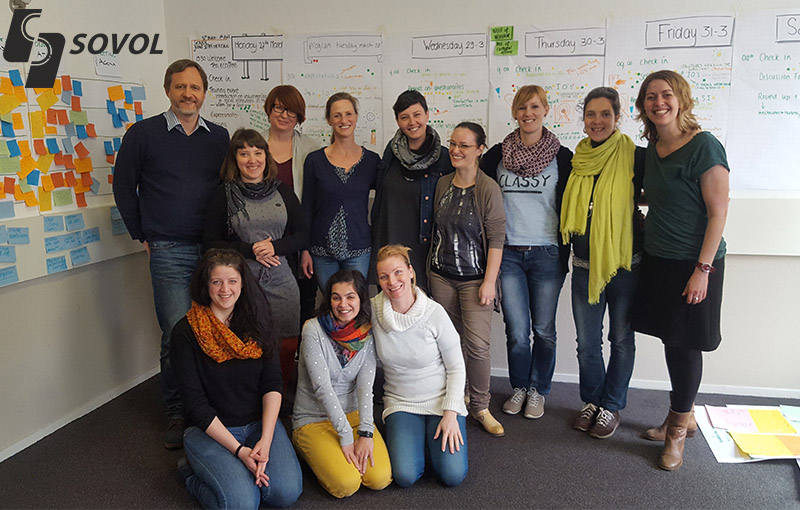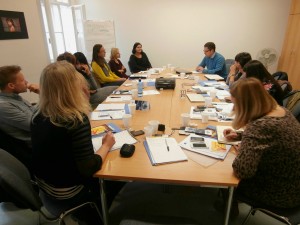CAPACITY BUILDING IN THE SOCIAL SECTOR through the Development of Volunteer Programs at Social Institutions in the CEE Region – SoVol
This project’s goal is that the social sector in the CEE region realizes and learns to utilize the untapped potential that lies in the cooperation with the local community. Through the SoVol European project, social institutions (run by the government or local government) will be able to develop and implement volunteer programmes involving local citizens into their operations thus enabling them to provide higher quality services to a wider range of clients and will be able to better respond to individual needs. In order to be able to make the best use of the benefits of volunteers tailor-made volunteer strategy and various training is needed. The project aims to prepare a practical methodology for social institutions on how to involve volunteers effectively into their institution.
The methodology toolkit is set up of the following modules covering all areas of implementing successful volunteer programmes into social institutions:
1. A step by step guidebook that contains the key guidelines that have to be followed and provided for a successful volunteer program in any social institution. It covers the followings: financial, human and other resources necessary to launch and to ensure the effective operation of the system; required attitudes by employers, employees, clients and volunteers; How to achieve the atmosphere that is welcoming volunteers; How to elaborate a volunteer strategy of a social institution; How to assess risk; what administration tools and methods are required.
2. A training curricula for employees of social institutions in order to raise awareness and teach them new competences and skills. This output consists of 3 different training curricula:
– Sensitivity training for all employees and stakeholders of a social institution;
– Training for volunteer managers
– Training for volunteer mentors
3. A training curriculum for volunteers of social institutions with a focus on clients such as elderly, children living in foster care, addicts, homeless people, disabled people and psychiatric patients.
4. A handbook on measurement and communication of the impact of volunteering in social institutions that aims to provide the social institutions with practical knowledge in order to raise the public awareness on the value that volunteers bring to the social institutions services and to the overall society. The handbook will look to accommodate basic principles of ensuring quality in volunteer management and a mutually satisfactory volunteering experience for all the parties involved (social institution, volunteer and beneficiaries) and will use the results of the previous project some of the project partners have implemented together regarding the role of the volunteer manager and the quality standards for the volunteer programs.
There are countries in Europe that have already tackled the integration of volunteers into social care institutions and their methods and approaches could serve as good examples. Therefore a study visit to the Netherlands will add to the knowledge and experience that will be comprised in the tool kit.
As part of the project the elaborated guidebooks and training courses will be piloted in each participating country. At a chosen social institution a volunteer program will be launched and mentored to test the tool kit. Upon the feedback gained from the pilot phase the toolkit will be finalized. Finally national dissemination events will be organized in the following countries: Poland, Hungary, Croatia, Slovenia and Romania. An international conference will take place in Budapest to share the possibility of capacity building of the social sector though volunteering.
As a result of the project the number and the quality of volunteer programs will seriously increase in Central and Eastern European where these programs greatly missing.
This project was financed under Erasmus+ Programme, contract number: 16/1/KA204/22920, Key Action: Cooperation for innovation and the exchange of good practices, Action: Strategic Partnerships, Duration of the project: 01. 09. 2016 – 31. 08. 2019. Coordinator: Önkéntes Központ Alapítvány, www.onkentes.hu Hungary. Project partners: Slovakia: PDCO: Platforma dobrovolnickych centier a organizacii, www.dobrovolnickecentra.sk, Croatia: SMART: Udruga za razvoj civilnog drustva SMART, www.smart.hr, Rijeka, Poland: SCW: Stowarzyszenie Centrum Wolontariatu, wolontariat.waw.pl, Warsawa, Romania, Pro Vobis: Asociatia Pro Vobis – Centrul National de Resurse pentru Voluntariat, Cluj-Napoca, www.provobis.ro, Netherlands, Movisie – Kennis En Advies Voor Maatschappelijke Ontwikkeling, www.movisie.nl, Utrecht.




